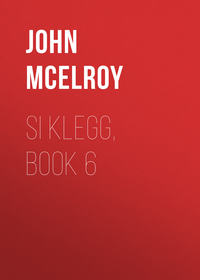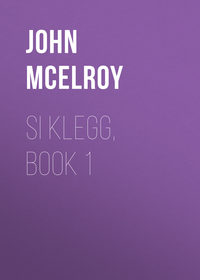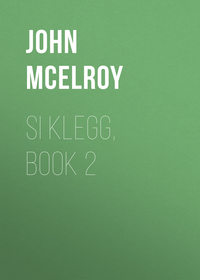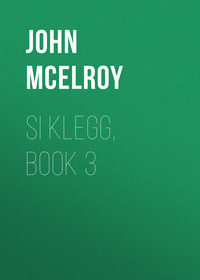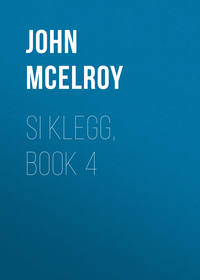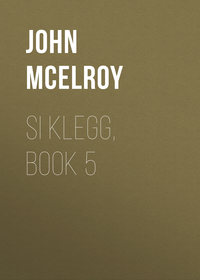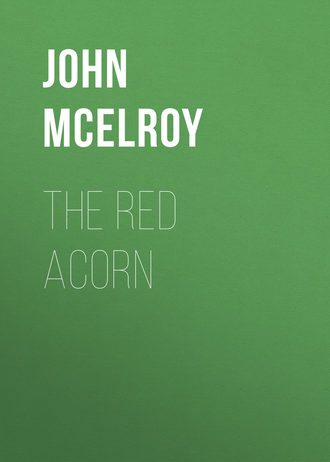 полная версия
полная версияThe Red Acorn
“Ye want ter walk slow,” continued Fortner, “an’ feel keefully with yer foot every time afore ye sot hit squar’ly down. Keep yer left hand a-feelin’ the rocks above yer, so’s ter make shore all the time thet ye’re close ter ‘em. ‘Bout half way, thar’s a big break in the path. Hit’s jess a long step acrost hit. Take one step arter I say thet I’m acrost; the feel keerfully with yer left foot fur the aidge o’ the break, an’ then step out ez long ez ye kin with yer right. That’ll bring ye over. Be shore o’ yer feet, an ye’ll be all right.”
Harry trembled more than at any time before. They were already on the path around the steep cliff. The darkness was inky. The roar of the waters below rose loudly—angrily. The wails of the wildcats behind, overhead and in front of them, made it seem as if the sighing pines and cedars were inhabited with lost spirits shrieking warnings of impending disaster.
Harry’s foot came down upon a boulder which turned under his weight. He regained his balance with a start, but the stone toppled over. He listened. There were scores of heart-beats before it splashed in the water below.
“Not so much as a twig between here and eternity,” he said to himself, with a shudder. Then aloud: “Can’t we stay here, some place, and not go along there to-night?”
The roar of the water drowned his voice before it reached Fortner’s ears, and Harry, obeying the instinct to accept leadership, followed the mountaineer tremblingly.
In a little while he felt—more than saw—Fortner stop, adjust his feet, and make a long stride forward with one of them. Glen collected himself for the same effort. He had need of all of his resolution, for the many narrow escapes which he had made from slipping into the hungry torrent, had shaken every nerve.
“I’m over,” called out Fortner. “Ye try hit now.”
Harry balanced his gun so as to embarrass him the least, and carefully felt with his left foot for the edge of the chasm. The catamount announced his renewed presence by a vindictive scream. The clouds parted just enough to let through a rift of gray light, but it fell not upon the brink of the black gap in the path. It showed for an instant the whirlpool, with fragments of tree trunks, of ghastly likeness to drowned human bodies, eddying dizzily around.
“Come on,” called out Fortner, impatiently.
Harry stepped out desperately. For a mental eternity he hung in air. His hands relaxed and his gun dropped with a crash and a splash. Then his foot touched the other side with nervous doubtfulness. It slipped, and he felt himself falling—falling into all that he feared. Fortner grasped his collar with a strong hand, and dragged him up against the rocky wall of the path.
“Thar, yer all right,” he said, panting with the exertion, “but hit wuz a mouty loud call for ye. Gabriel’s ho’n couldn’t’ve made a much mo’ powerful one.”
“I’ve lost my gun,” said Harry, regretfully, as soon as he could compose himself.
“Cuss-an’-burn the blasted ole smooth-bore,” said Fortner, contemptuously. “Don’t waste no tear on that ole kick-out-behind. We’ll go ‘long ‘tween Wildcat an’ the Ford, an’ pick up a wagon-load uv ez good shooters ez thet clumsy chunk o’ pot-metal wuz. Shake yourself together. We’ve on’y got a mile or so ter go now.”
In Harry’s condition, the “mile or so” seemed to be stretching out a long ways around the globe, and he began to ask himself how near he was to the much-referred-to “heart of the Southern Confederacy.”
At length a little fading toward gray of the thick blackness, to that they had emerged from the heavy woods into more open country. Harry thought they were come to fields, but he could see nothing, and without remark plodded painfully after his leader.
Suddenly a large pack of dogs immediately in front of them broke the stillness with a startling diapason, ranging from the deep bass of the mastiff to the ringing bark of the fox-hounds. Mingled with this was the sound of the whole pack rushing fiercely forward. Fortner stopped in his tracks so abruptly that Glen stumbled against him. The mountaineer gave the peculiar whistle he had uttered at the Ford. The rush ceased instantly. The deep growls of the mastiffs and bull-dogs stopped likewise; only the hounds and the shrill-voiced young dogs continued barking.
The darkness was rent by a long narrow lane of light. A door had been opened in a tightly-closed house, just beyond the dogs.
“Down, Tige! Git out, Beauty!” said Forstner, imperiously. “Lay down, Watch! Quiet Bruno!”
The clamors of the gang changed to little yelps of welcome.
“Is that you, Jim?” inquired a high-pitched but not unpleasant voice, from the door.
“Yes, Aunt Debby,” answered Fortner, “an’ I hev some one with me.”
As the two approached, surrounded by the fawning dogs, a slender, erect woman appeared in the doorway, holding above her head, by its nail and chain, one of the rude iron lamps common in the houses of the South.
“Everything all right, Aunt Debby?” asked Fortner, as, after entering, he turned from firmly securing the door, by placing across it a strong wooden bar that rested in the timbers on either side.
“Yes, thank God!” she said with quiet fervor. She stepped with graceful freedom over the floor, and hung the lamp up by thrusting the nail into a crack in one of the logs forming the walls of the room. “An’ how is hit with ye?” she asked, facing Fortner, with her large gray eyes eloquent with solicitude.
“O, ez fur me, I’m jes ez sound ez when I left heah last week, ‘cept thet I’m tireder ‘n a plow mule at night, an’ hongrier nor a b’ar thet’s lived all Winter by suckin’ hits paws.”
“I s’pose y’ air tired an’ hongry; ye look hit,” said the woman, with a compassionate glance at Harry, who had sunk limpy into a chair before the glowing wood-fire that filled up a large part of the end of the room.
“Set down by the fire,” she continued, “an’ I’ll git ye some pone an’ milk. Thar’s nothin’ better ter start in on when yer rale empty.” She went to a rude cupboard in the farther part of the room, whence the note of colliding crockery soon gave information that she was busy.
Fortner took a bunch of tow from his pouch, and with it wiped off every particle of dampness from the outside of his rifle, after which he laid the gun on two wooden hooks above the fireplace, and hung the accouterments on deer horns at its breech.
“Pull off yer shoes an’ toast yer feet,” he said to Harry. “The fire’ll draw the tiredness right out.”
Harry’s relaxed fingers fumbled vainly with the wet and obstinate shoe-strings. Aunt Debby came up with a large bowl of milk in each hand, and a great circular loaf of corn-bread under her arm. She placed her burden upon the floor, and with quick, deft fingers loosened the stubborn knots without an apparent effort, drew off the muddy shoes and set them in a dark corner near the fireplace before Harry fairly realized that he had let a woman do this humble office for him. The sight and smell of food aroused him from the torpor of intense fatigue, and he devoured the homely fare set before him with a relish that he had never before felt for victuals. As he ate his senses awakened so that he studied his hostess with interest. Hair which the advancing years, while bleaching to a snowy white had still been unable to rob of the curling waves of girlhood, rippled over a broad white brow, sober but scarcely wrinkled; large, serious but gentle gray eyes, and a small, firm mouth, filled with even white teeth were the salient features of a face at once resolute, refined and womanly. Long, slender hands, small feet, covered with coarse but well-fitting shoes, a slight, erect figure, suggestive of nervous strength, and clad in a shapely homespun gown stamped her as a superior specimen of the class of mountaineer woman to which she belonged.
“Heah’s ‘nuther pone, honey,” she said to Fortner, as she handed both of them segments of another disk of corn-bread, to replace that which they had ravenously devoured. “An’ le’ me fill yer bowls agin. Hit takes a powerful sight o’ bread an’ milk ter do when one’s rale hongry. But ‘tain’t like meat vittels. Ye can’t eat ‘nuff ter do ye harm.”
She took from its place behind the rough stones that formed the jam of the fireplace a rude broom, made by shaving down to near its end long slender strips from a stick of pliant green hickory, then turning these over the end and confining them by a band into an exaggerated mop or brush. With this she swept back from the hearth of uneven stones the live coals flung out by the fire.
“Thar’s some walnut sticks amongst thet wood,” she said as she replaced the hearth-broom, “an’ they pops awful.”
From a pouch-like basket, made of skilfully interwoven hickory strips, and hanging against the wall, she took a half-finished stocking and a ball of yarn. Drawing a low rocking-chair up into the light, she seated herself and began knitting.
As he neared the last of his second bowl of milk Fortner bethought himself, and glanced at Aunt Debby. Her work had fallen from her nervous hands and lay idly in her lap, while her great eyes were fixed hungrily upon him.
“They’ve bin fouten over ter Wildcat to-day,” he said, answering their inquiry, without waiting to empty his mouth.
“Yes, I heard the cannons,” she said with such gentle voice as made her dialect seem quaint and sweet. “I clim up on Bald Rock at the top o’ the mounting an’ lissened. I could see the smoke raisin’, but I couldn’t tell nothin’. Much uv a fout?”
“Awful big’un. Biggest ‘un sence Buner Vister. Ole Zollicoffer pitched his whole army onter Kunnel Gerrard’s rijimint. Some other rijiments cum up ter help Kunnel Garrard, an’ both sides fit like devis fur three or fur hours, an’ the dead jess lay in winrows, an’–”
The demands of Fortner’s unappeased appetite here rose superior to his desire to impart information. He stopped to munch the last bit of corn-bread and drain his bowl to the bottom.
“Yes,” said Aunt Debby, inhospitably disregarding the exhaustion of the provender, and speaking a little more quickly than her wont, “but which side whipt?”
“Our’n, in course,” said Fortner, with nettled surprise at the question. “Our’n, in course. Old Zollicoffer got ez bad a licken ez ever Gineral Zach Taylor gi’n the Mexicans.”
“Rayally?” she said. Gratification showed itself in little lines that coursed about her mouth, and her eyes illumined as when a light shines through a window.
“Yes,” answered Fortner. “Like hounds, and run clean ter the Ford, whar they’re now a-fouten an’ strugglin to git acrost, and drowndin’ like so many stampeded cattle.”
“Glory! Thank God!” said Aunt Debby. Her earnestness expressed itself more by the intensity of the tone than its rise.
“Evidently a tolerable regular attendant at Methodist camp-meetings,” thought Harry, rousing a little from the torpor into which he was falling.
Her faded check flushed with a little confusion at having suffered this outburst, and picking up her knitting she nervously resumed work.
Fortner looked wistfully at the bottom of his emptied bowl. Aunt Debby took it away and speedily returned with it filled. She came back with an air of eager expectancy that Fortner would continue his narrative. But unsatisfied hunger still dominated him, and he had thoughts and mouth only for food. She sad down and resumed her knitting with an apparent effort at composing herself.
For a full minute the needles clicked industriously. Then they stopped; the long, slender fingers clenched themselves about the ball of yarn; she faced Fortner, her eyes shining with a less brilliant but intenser light.
“Jim Fortner,” she said with low, measured distinctness, “why don’t ye go on? Is thar somethin’ that ye’r afeered ter tell me? What hez hapened ter our folks? Don’t flinch from tellin’ me the wust. I’m allers willin’ ter bow ter the will o’ the Lord without a murmur. On’y let me know what hit is.”
“Why, Aunt Debby, thar hain’t been nothin’ happened ter ‘em,” said Fortner, deeply surprised. “Thar ain’t nothin’ ter tell ye ‘bout ‘em. They’re all safe. They’re in Kunnel Garrard’s rijimint, ez ye know, an’ hit fit behind breastworks, and didn’t lose nobody, scacely—leastwise none uv our kin.”
She rose quickly from her chair. The ball of yarn fell from her lap and rolled unheeded toward the glowing coals under the forelog. With arm outstretched, hands clasped, and eyes directed upward in fervent appeal, there was much to recall that Deborah from whom she took her name—that prophetess and priestess who, standing under the waving palm trees of Ball-Tamar, inspired her countrymen to go forth and overthrow and destroy their Canaanitish oppressors.
“O, God!” she said in low, thrilling tones, “Thou’s aforetimes gi’n me much ter be thankful fur, as well ez much ter dumbly ba’r when Thy rod smote me fur reasons thet I couldn’t understand. Thou knows how gladly I’d’ve gi’n not on’y my pore, nigh-spent life, but also those o’ my kinsmen, which I prize much higher, fur sech a vict’ry ez this over the inimies of Thee an’ Thy people. But Thou’st gi’n hit free ez Thy marcy, without axin’ blood sacrifice from any on us. I kin on’y praise Thee an’ Thy goodness all my days.”
Fortner rose and listend with bowed head while she spoke. When she finished he snatched up the ball of shriveling yarn and quenched its smoking with his hand. Looking fixedly at this he said softly: “Aunt Debby, honey, I hain’t tole ye all yit.”
“No, Jim?”
“No,” said he, slowly winding up the yarn, “Arter the fouten wuz thru with at the Gap I slipt down the mounting, an’ come in on the r’ar uv those fellers, an’ me an’ this ere man drapt two on ‘em.”
“I kinder ‘spected ye would do something uv thet sort.”
“Then we tuk a short cut an’ overtuk ‘em agin, an’ we drapt another.”
Aunt Debby’s eyes expressed surprise at this continued good fortune.
“An’ then we tuk ‘nuther short cut, an’ saved ‘nuther one.”
Aunt Debby waited for him to continue.
“At last—jess ez they come ter the Ford—I seed OUR man.”
“Seed Kunnel Bill Pennington?” The great gray eyes were blazing now.
“Yes.” Fortner’s speech was the spiritless drawl of the mountains, and it had now become so languid that it seemed doubtful if after the enunciation of each word whether vitality enough remained to evolve a successor. “Yes,” he repeated with a yawn, as he stuck the ball of yarn upon the needles and gave the whole a toss which landed it in the wall-basket, “an’ I GOT him, tew.”
“O, just God! Air ye shore?”
“Jess ez shore ez in the last great day thar’ll be some ‘un settin’ in judgement atween him an’ me. I wanted him ter be jess ez shore about me. I came out in plain sight, and drawed his attention. He knowed me at fust glimpse, an’ pulled his revolver. I kivered his heart with the sights an’ tetcht the trigger. I’m sorry now thet I didn’t shoot him thru the belly, so thet he’d been a week a-dyin’ an’ every minnit he’d remembered what he wuz killed fur. But I wuz so afeered that I would not kill him ef I hit him some place else’n the heart—thet’s a wayall pizen varmints hev—thet I didn’t da’r resk hit. I wuz detarmined ter git him, too, ef I had ter foller him clean ter Cumberland Gap.”
“Ye done God’s vengeance,” said Aunt Debby sternly. “An’ yit hit wuz very soon ter expect hit.” She clasped her hands upon her forehead and rocked back and forth, gazing fixedly into the mass of incandescent coals.
“Hit’s gwine to cla’r up ter-morrow,” said Fortner, returning from an inspection of the sky at the door. “Le’s potter off ter bed,” he continued rousing up Harry. They removed their outer garments and crawled into one of the comfortable beds in the room.
Later in the night a sharp pain in one of Harry’s over-strained legs awoke him out of his deep slumber, for a few minutes. Aunt Debby was still seated before the fire in her chair, rocking back and forth, and singing softly:
“Thy saints in all this glorious war, Shall conquer ere they die. They see the triumph from afar— By faith they bring hit nigh. Sure I must suffer ef I would reign; Increase my courage, Lord. I’ll bear the toil, endure the pain.”He went to sleep again with the sweet strains ringing in his ears, as if in some way a part of the marvelous happenings of that most eventful day.
Chapter XII. Aunt Debby Brill
Beneath the dark waves where the dead go down, There are gulfs of night more deep; But little they care, whom the waves once drown, How far from the light they sleep. And dark though Sorrow’s fearful billows be, They have caverns darker still. O God! that Sorrow’s waves were like the sea, Whose topmost waters kill.-Anonymous.It was nearly noon when Harry awoke. The awakening came slowly and with pain. In all his previous experiences he had had no hint even of such mental and bodily exhaustion as now oppressed him. Every muscle and tendon was aching a bitter complaint against the strain it had been subjected to the day before. Dull, pulseless pain smoldered in some; in others it was the keen throb of the toothache. Continued lying in one position was unendurable; changing it, a thrill of anguish; and the new posture as intolerable as the first. His brain galled and twinged as did his body. To think was as acute pain as to use his sinews. Yet he could not help thinking any more than he could help turning in the bed, though to turn was torture.
Every organ of thought was bruised and sore. The fearful events of the day before would continue to thrust themselves upon his mind. To put them out required painful effort; to recall and comprehend them was even worse. Reflecting upon them now, with unstrung nerves, made them seem a hundred-fold more terrible than when they were the spontaneous offspring of hot blood. With the reflection came the thoughts that this was but a prelude—an introduction—to an infinitely horrible saturnalia of violence and blood, through which he was to be hurried until released by his own destruction. This became a nightmare that threatened to stagnate the blood in his veins. He gasped, turned his back to the wall with an effort that thrilled him with pain, and opened his eyes.
Naught that he saw reminded him of the preceding day. Sunny peace and contentment reigned. The door stood wide open, and as it faced the south, the noonday sun pushed in—clear to the opposite wall—a broad band of mellow light, vividly telling of the glory he was shedding where roof nor shade checked his genial glow. On the smooth, hard, ashen floor, in the center of this bright zone, sat a matronly cat, giving with tongue and paw dainty finishing touches to her morning toilet, and watching with maternal pride a kittenish game of hide-and-seek on the front step. Through the open doorway came the self-complacent cackling of hens, celebrating their latest additions to their nests, and the exultant call of a cock to his feathered harem to come, admire and partake of some especially fat worm, which he had just unearthed. Farther away speckled Guinea chickens were clamoring their satisfaction at the improvement in the weather. Still farther, gentle tinklings hinted of peacefully-browsing sheep.
Inside the house, bunches of sweet-smelling medicinal herbs, hanging agains the walls to dry, made the air heavy with their odors. Aunt Debby was at work near the bright zone of sun-rays, spinning yarn with a “big wheel.” She held in one hand a long slender roll of carded wool, and in the other a short stick, with which she turned the wheel. Setting it to whirling with a long sweep of the stick against a spoke, she would walk backward while the roll was twisted out into a long, thin thread, and then walk forward as they yarn was wound upon the spindle. When she walked backward, the spindle hummed sharply; when she came forward it droned. There was a stately rhythm in both, to which her footsteps and graceful sway of body kept time, and all blended harmoniously with the camp-meeting melody she was softly singing:
“Jesus, I my cross have taken, All to leave and follow Thee; Naked, poor, despised, forsaken, Thou from hence my all shalt be. Perish every fond ambition— All I’ve sought, or hoped, or known; Yet how rich is my condition— God and Heaven still my own.”A world of memories of a joyous past, unflecked by a single one of the miseries of the present, crowded in upon Harry on the wings of this well-remembered tune. It was a favorite hymn at the Methodist church in Sardis, and the last time he had heard it was when he had accompanied Rachel to the church to attend services conducted by a noted evangelist.
Ah, Rachel!—what of her?
He had not thought of her since a swift recollection of her words at the parting scene on the piazza had come to spur up his faltering resolution, as the regiment advanced up the side of Wildcat. Now one bitter thought of how useless all that he had gone through with the day before was to rehabilitate himself in her good opinion was speedily chased from his mind by the still bitterer one of the contempt she must feel for him, did she but know of his present abject prostration.
After all, might not the occurrences of yesterday be but the memories of a nightmare? They seemed too unreal for probability. Perhaps he was just recovering consciousness after the delirium of a fever.
The walnut sticks in the fireplace popped as sharply as pistols, and he trembled from head to foot.
“Heavens, I’m a bigger coward than ever,” he said bitterly, and turning himself painfully in bed, he fixed his eyes upon the wall. “I was led to believe,” he continued, “that after I had once been under fire, I would cease to dread it. Now, it seems to me more dreadful than I ever imagined it to be.”
Aunt Debby’s wheel hummed and droned still louder, but her pleasant tones rode on the cadences like an Aeolian harp in a rising wind:
“Man may trouble and distress me, ‘T will but drive me to Thy breast; Life with trials hard may press me; Heaven will bring me sweeter rest. O, ‘tis not in grief to harm me, While Thy love is left to me. O, ‘twere not in joy to charm me, Were that joy unmixed with Thee.”He wondered weakly why ther were no monasteries in this land and age, to serve as harbors or refuge for those who shrank from the fearfulness of war.
He turned over again wearily, and Aunt Debby, looking toward him, encountered his wide-open eyes.
“Yer awake, air ye?” she said kindly. “Hope I didn’t disturb you. I wuz tryin’ ter make ez little noise ez possible.”
“No, you didn’t rouse me. It’s hard for me to sleep in daylight, even when fatigued, as I am.”
“Ef ye want ter git up now,” she said, stopping the whell by pressing the stick against a spoke, and laying the “roll” in her hand upon the wheel-head, “I’ll hev some breakfast fur ye in a jiffy. Ye kin rise an’ dress while I run down ter the spring arter a fresh bucket o’ water.”
She covered her head with a “slat sun-bonnet,” which she took from a peg in the wall, lifted a cedar waterpail from a shelf supported by other long pegs, poured its contents into a large cast-iron teakettle swinging over the fire, and whisked out of the door. Presently the notes of her hymn mingled in plaintive harmony with the sparkling but no sweeter song of a robin redbreast, twittering his delight in the warm sunshine amid the crimson apples of the tree that overhung the spring.
“Will ye hev a fresh drink?” she asked Harry, on her return.
He took the gourdful of clear, cool water, which she offered him, and drank heartily.
“Thet hez the name o’ bein’ the best spring in these parts,” she said, pleased with his appreciation.
“An’ hit’s a never-failin’ spring, too. We’ve plenty o’ water the dryest times, when everybody else’s goes dry.”
“That IS delicious water,” said Harry.
“An’ now I’ll git ye yor breakfast in a minnit. The teakittle’s a-bilin’, the coffee’s ground, the pone’s done, an’ when I fry a little ham, everything will be ready.”
As her culinary methods and utensils differed wholly from anything Harry had ever seen, he studied them with great interest sharpened not a little by a growing appetite for breakfast.
The clumsy iron teakettle swung on a hook at the end of a chain fastened somewhere in the throat of the chimney. On the rough stones forming the hearth were a half-dozen “ovens” and “skillets”—circular, cast-iron vessels standing on legs, high enough to allow a layer of live coals to be placed beneath them. They were covered by a lid with a ledge around it, to retain the mass of coals heaped on top. The cook’s scepter was a wooden hook, with which she moved the kettles and ovens and lifted lids, while the restless fire scorched her amrs and face ruddier than cherry.


